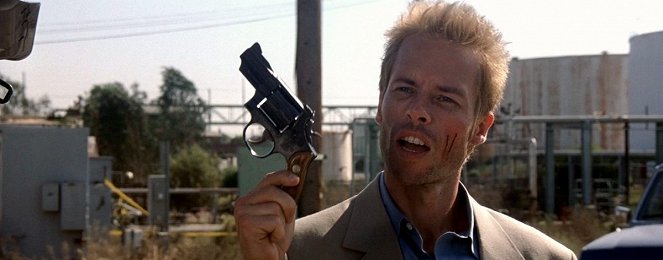Regie:
Christopher NolanDrehbuch:
Christopher NolanKamera:
Wally PfisterMusik:
David JulyanBesetzung:
Guy Pearce, Carrie-Anne Moss, Joe Pantoliano, Mark Boone Junior, Jorja Fox, Stephen Tobolowsky, Harriet Sansom Harris, Thomas Lennon (mehr)Streaming (1)
Inhalte(1)
Rache ist die Aufgabe, die sich der ehemalige Versicherungsermittler Leonard Shelby (Guy Pearce) seit dem Vergewaltigungsmord an seiner Frau Catherine (Jorja Fox) gestellt hat. Ein beinahe aussichtsloses Unterfangen. Denn seit der schrecklichen Tat leidet Shelby an einem Verlust seines Kurzzeitgedächtnisses. Ohne seine Notizen, Fotos oder Tätowierungen am Körper, kann er sich an nichts mehr erinnern. Verzweifelt sucht er den Mörder seiner Frau. Der scheinbar so hilfreiche Teddy (Joe Pantoliano) und die mysteriöse Natalie können ihm vielleicht helfen... (Columbia TriStar Film)
(mehr)Videos (1)
Kritiken (12)
Ein fesselnder Essay für eingefleischte Theoretiker der Filmnarratologie? Vor allem aber ist es ein brillanter Film, der alles hat, was ein guter Thriller haben muss. Die Darbietungen von Guy Pearce, Carrie-Anne Moss und Joe Pantoliano sind präzise, lebendig und passen perfekt zu den Figuren. Der Hauptdarsteller ist jedoch Jonathan Nolan, der eine Lektion in Sachen Drehbuchschreiben und Regie erteilt. Der Schachzug, dem Zuschauer die Perspektive der Hauptfigur näher zu bringen (d. h. die Perspektive des schnellen Vergessens der vergangenen Handlung), indem die Geschichte vom Ende her erzählt wird, ist hervorragend, aber der eigentliche Leckerbissen ist die Darstellung. Nolan hat unglaublich gut mit der Konstruktion von Memento gespielt, indem er kleine Hinweise in die fiktive Welt gestreut hat, die der Zuschauer in seiner anfänglichen Orientierungslosigkeit vielleicht kaum wahrnimmt und deshalb einen guten Grund hat, zum Film zurückzukehren. Der Schluss (eigentlich der Anfang) ist sehr verwirrend, aber er entspricht genau dem Trick der subjektiven Sicht durch die Augen der Hauptfigur. Relativität in Erinnerungen und "Wahrheit" der Vergangenheit, dargestellt par excellence. Das Unterhaltsamste an Memento ist jedoch die detektivische Ebene, die der Zuschauer so mühsam rekonstruieren muss, dass er vom Drehen des Erzählstroms Blasen bekommt und ihm Schweißperlen auf die Stirn treten. Für die Blasen und den Schweiß hat Memento fünf Sterne und den Titel eines der interessantesten Filme der letzten Jahre verdient.
()
Memento has just a few blemishes on its beauty; bland music, two logic hiccups and one or two other problems. But they are just tiny little spots and the in essence simple screenplay is genius storytelling. I wouldn’t compare it to the Czech movie Happy End; Memento doesn’t go backwards, it’s just the individual chapters that go backwards here. Nolan proved that, even with minimum resources, it’s possible to shoot a thriller of genius if you have good screenplay combined with inventive directing.
()
This amazingly original thriller was a truly unique experience. I don’t remember ever exercising my brain so much. It’s one of those few films that can never put anyone to sleep, and although it made me pretty tired, I couldn’t go to sleep after it, it makes you think even after it has finished. And I can’t avoid watching it again. Magnificent.
()
When your life becomes a point-and-click adventure and you find yourself again and again in unfamiliar places, where you try to figure out what to do with the aid of the objects that you have with you and around you... Leonard’s only “data repository” is his own body (not his mind), on which he has important information tattooed (an extension of his body is a Polaroid camera, which he uses to take pictures of the people entering his life and which therefore replaces his visual memory). His identity is based only on what he has written down and what can be interpreted in conflict with the original meaning, which is perhaps an even more relevant theme today, in an age when we let our lives be controlled by smartphones, than it was at the turn of the millennium. The expression of uncertainty in the relationship of the “self” to itself and to the outside world comprises only one of the levels of inspiration in Nolan’s ambitious updating of noir conventions for the (post)modern era (the formalistically unique films of European modernist cinema served him well in this regard). The director’s aim was to put us in the position of a man with no short-term memory. The narrative perspective is fixed on Leonard throughout the film. We see and hear only what he sees and hears. The protagonist does not remember what happened a few minutes ago and because of the non-chronological narrative, we don’t know either. Because we know the future, however, we can piece together the overall picture more easily than Leonard can. We gradually assign causes to the consequences of events and try to arrange events in chronological order in our minds, which is a slightly more demanding thought process requiring a different schematic than in the case of a standard narrative running from point A to point B. On the other hand, the linearity of the film (which makes Memento different from Following with its scenes in a jumbled sequence) makes our work easier. The individual scenes in the colour and black-and-white storylines build on each other. The former runs backwards and the latter forward in the standard way (and though it pretends to be a more objective record of reality, it contains flashbacks that are not entirely reliable), so that they intersect in the climax, which is strikingly reminiscent of the beginning and thus draws attention to the hopeless cyclicity of Leonard’s situation. At the same time, the two storylines are complementary in many ways and help us to understand the protagonist’s situation and his objective relatively early in the film. If Memento ran chronologically, it would lose a substantial part of its mysterious nature, unravelling the mystery would be a much smaller challenge and the themes of remembering, forgetting and the flow of time would not have been incorporated directly into the structure of the film. In other words, the complexity of the narrative is not an end in itself, but a determinative feature. 90%
()
Narrative excellence where the inverted form of narration is the means, not the purpose. Nolan, in his first overseas outing, gives credit to his favorite properties (the man still wears his wedding ring after losing his wife) and teases with simple and economical filmmaking, where the characters and the plot play the primary role, where watching them is a challenging sport, and where even a moment's inattention can leave you in the dark. I'm fascinated by how, despite knowing the "good" ending, Nolan puts the pieces of the puzzle together impressively, with the reverse form creating tension even more strongly than traditional chronology. Who knew that this same person would one day make the most distinctive comic book trilogy and be able to afford to make spectacular sci-fi without using green screens, but... in retrospect, it feels like a deliberate journey by a purposeful filmmaker, just like this film.
()



Werbung